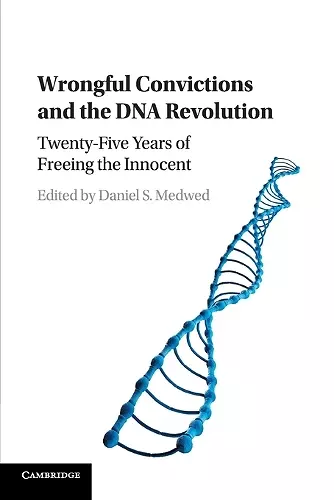Wrongful Convictions and the DNA Revolution
Twenty-Five Years of Freeing the Innocent
Format:Paperback
Publisher:Cambridge University Press
Published:10th May '18
Currently unavailable, and unfortunately no date known when it will be back
This paperback is available in another edition too:
- Hardback£110.00(9781107129962)

This book examines the lessons learned from twenty-five years of using DNA to free innocent prisoners and identifies lingering challenges.
For centuries, most people believed the criminal justice system worked - that only guilty defendants were convicted. DNA technology shattered that belief. DNA has now freed more than three hundred innocent prisoners in the United States. This book examines the lessons learned from twenty-five years of DNA exonerations and identifies lingering challenges.For centuries, most people believed the criminal justice system worked - that only guilty defendants were convicted. DNA technology shattered that belief. DNA has now freed more than three hundred innocent prisoners in the United States. This book examines the lessons learned from twenty-five years of DNA exonerations and identifies lingering challenges. By studying the dataset of DNA exonerations, we know that precise factors lead to wrongful convictions. These include eyewitness misidentifications, false confessions, dishonest informants, poor defense lawyering, weak forensic evidence, and prosecutorial misconduct. In Part I, scholars discuss the efforts of the Innocence Movement over the past quarter century to expose the phenomenon of wrongful convictions and to implement lasting reforms. In Part II, another set of researchers looks ahead and evaluates what still needs to be done to realize the ideal of a more accurate system.
'This thoughtful collection of essays on one of the most important scientific and legal advances of the past century is a must read for anyone who wants to understand American criminal justice. Exonerations have so much to teach us about what goes wrong in police encounters, prosecutors' offices, and courtrooms around the country, and this book serves as a much needed guide.' Rachel E. Barkow, Segal Family Professor of Regulatory Law and Policy and Faculty Director, Center on the Administration of Criminal Law, New York University School of Law
'This excellent and timely collection examines the revolutionary impact of DNA identification on American criminal justice. It explores the major changes triggered by DNA exonerations, starting in 1989 - in criminal investigation, trial procedure, the use of the death penalty - and it discusses the challenges we still face and reforms that may yet happen.' Samuel R. Gross, Thomas and Mabel Long Professor of Law, University of Michigan
'Wrongful Convictions and the DNA Revolution should be required reading for prosecutors, defense attorneys, judges, and jurors alike. The book magnificently lays bare the painful but critical lessons from twenty-five years of struggle for exoneration of the innocent.' Jeannie Suk Gersen, John H. Watson, Jr Professor of Law, Harvard Law School
'The chapters of Wrongful Convictions and the DNA Revolution summarize remarkable strides achieved by the Innocence Movement, provide insight into the movement's legal and institutional elements, and point to future challenges. Every criminal law scholar in law schools and criminal justice departments would benefit by reading the volume. It is an excellent high-level entry point for criminologists new to wrongful conviction research. Instructors could assign individual chapters in advanced wrongful conviction courses. In sum, Daniel S. Medwed's volume deserves a central place in the growing library of wrongful conviction scholarship.' Marvin Zalman, Criminal Law and Criminal Justice Books (www.clcjbooks.rutgers.edu)
ISBN: 9781107570467
Dimensions: 230mm x 153mm x 28mm
Weight: 700g
439 pages